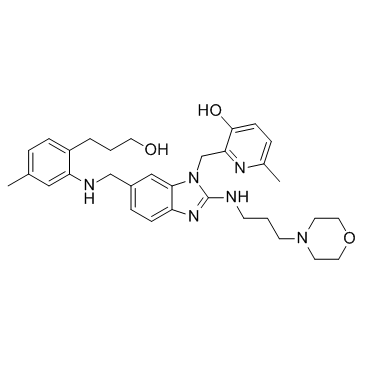857066-90-1
| Name | 2-[[6-[[2-(3-hydroxypropyl)-5-methylanilino]methyl]-2-(3-morpholin-4-ylpropylamino)benzimidazol-1-yl]methyl]-6-methylpyridin-3-ol |
|---|---|
| Synonyms |
unii-538ebt31z1
cs-0682 TMC353121 |
| Description | TMC353121 is a potent respiratory syncytial virus (RSV) fusion inhibitor with pEC50 of 9.9. |
|---|---|
| Related Catalog | |
| Target |
pEC50: 9.9 (RSV)[1] |
| In Vitro | TMC353121 shows activity against groups A and B RSV and against a panel of clinical isolates with equal potency[1]. TMC353121 is a potent RSV fusion inhibitor in vitro. TMC353121 is active against wild-type RSV (strain LO), with a 50% effective concentration (EC50) of 0.07 ng/mL in HeLaM cells[2]. |
| In Vivo | After i.v. bolus administration of a single dose of 10 mg/kg to Sprague-Dawley rats, the plasma drug concentration-time profile of TMC353121 exhibits multicompartmental pharmacokinetics. Mean plasma drug concentrations decrease rapidly during the first hours after dosing and then more slowly, with a half-life of about 12 h, as determined for the last part of the curve between 8 and 24 h postdose. TMC353121 is rapidly eliminated from plasma (CL=8.6 liters/h/kg) and extensively distributed (Vss=55 liters/kg)[2]. TMC353121 is administered once, i.v. at 2.5 mg/kg or at 0.25 mg/kg. Drug levels are determined in lung tissue, serum, and BAL fluid at different time points. TMC353121 followed multicompartment pharmacokinetics, with a fast decay in serum within the first hour after i.v. injection, followed by a slower decay. The drug is eliminated quickly from the blood resulting in very low blood levels after 24 h. Lung concentrations are much higher than serum concentrations and in BAL fluid the drug is just above the limit of detection at 8 h after injection. Very low drug levels can still be detected in the lung 5 days after treatment[3]. |
| Animal Admin | Rats[2] Sprague-Dawley and cotton rats are given a single-bolus dose of 10 mg/kg TMC353121 intravenously (i.v.). Blood samples are taken from the orbital venous plexus of three Sprague-Dawley rats at 15 min and 1, 8, and 24 h postdose and from six Sprague-Dawley rats and six cotton rats at 3 h postdose. Blood samples are centrifuged at 1,500× g for 10 min, and plasma is separated and frozen until bioanalysis. After blood sampling, the rats are exsanguinated from the vena femoralis under isoflurane-oxygen anesthesia. Then they are euthanized by CO2 asphyxiation, and the lungs are subjected to lavage once via a tracheal cannula with phosphate-buffered saline (PBS) containing 2% bovine serum albumin (BSA) at room temperature at a volume of 5 mL per Sprague-Dawley rat or 2.5 mL per cotton rat. After gentle injection of the lavage fluid into the lungs, the fluid is withdrawn for collection of the bronchoalveolar lavage fluid (BALF) and the lungs are dissected. BALF is collected in order to assess TMC353121 concentrations in the lung epithelial lining fluid (ELF) after correction for the dilution with lavage fluid. A single lavage with a short dwelling time is applied as previously recommended for better accuracy of the determination of ELF dilution. BSA is added to the lavage fluid in order to prevent the adsorption of TMC353121 to syringes or other containers. The BALF is centrifuged at 300× g for 10 min, and the supernatant is separated. BALF supernatant and lung tissue samples are then frozen until bioanalysis. BALF supernatant is referred as BALF throughout this paper. Mice[3] Inbred 8- to 12-week-old female BALB/c mice are used. TMC353121 is administered intravenously in saline at doses of 0.25-10 mg/kg, and at various times in relation to the RSV infection. Mice are infected with 2×106 plaque-forming unit (PFU) of plaque-purified human strain RSV A2 (100 μL intranasally). Individual body weight is used to monitor animal health and response to infection, and is recorded daily. |
| References |
| Molecular Formula | C32H42N6O3 |
|---|---|
| Molecular Weight | 558.71400 |
| Exact Mass | 558.33200 |
| PSA | 110.93000 |
| LogP | 3.90600 |
| Storage condition | 2-8℃ |
